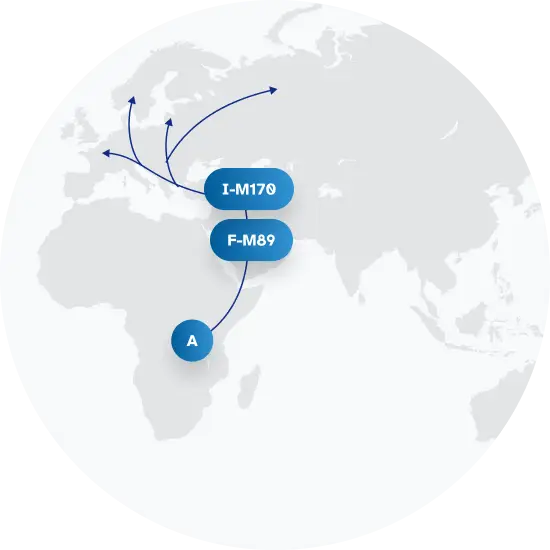Explore the Family Name Belcher
How common is the last name Belcher in the United States?
Based on the Decennial U.S. Census, the popularity of the surname Belcher has slightly decreased from 2000 to 2010. It was ranked as the 1,149th most popular surname in 2000 and dropped to the 1,243rd position in 2010, a change of -8.18%. The count of individuals with this surname, however, increased by 1.34% from 27,947 in 2000 to 28,321 in 2010. Despite this increase in count, the proportion per 100,000 people declined from 10.36 to 9.6, marking a -7.34% shift.
| 2000 | 2010 | Change | |
|---|---|---|---|
| Rank | #1,149 | #1,243 | -8.18% |
| Count | 27,947 | 28,321 | 1.34% |
| Proportion per 100k | 10.36 | 9.6 | -7.34% |
Race and Ethnicity of people with the last name Belcher
Regarding the ethnic identity associated with the surname Belcher, data from the Decennial U.S. Census shows some changes between 2000 and 2010. In 2000, 82.05% identified as White, which slightly decreased to 80.09% by 2010. The percentage of those identifying as Black increased from 14.41% to 15.12%. Individuals identifying as Hispanic also increased from 1.45% to 2.15%, while Asian/Pacific Islander representation grew from 0.29% to 0.44%. The percentage identifying with two or more races rose from 1.30% to 1.68%, and those identifying as American Indian and Alaskan Native saw a small increase from 0.50% to 0.52%.
| 2000 | 2010 | Change | |
|---|---|---|---|
| White | 82.05% | 80.09% | -2.39% |
| Black | 14.41% | 15.12% | 4.93% |
| Hispanic | 1.45% | 2.15% | 48.28% |
| Two or More Races | 1.3% | 1.68% | 29.23% |
| American Indian and Alaskan Native | 0.5% | 0.52% | 4% |
| Asian/Pacific Islander | 0.29% | 0.44% | 51.72% |
Belcher ancestry composition
23andMe computes an ancestry breakdown for each customer. People may have ancestry from just one population or they may have ancestry from several populations. The most commonly-observed ancestry found in people with the surname Belcher is British & Irish, which comprises 58.7% of all ancestry found in people with the surname. The next two most common ancestries are French & German (21.8%) and Spanish & Portuguese (2.7%). Additional ancestries include Eastern European, Scandinavian, Nigerian, Indigenous American, and Italian.
Ready to learn more about your ancestry? Get the most comprehensive ancestry breakdown on the market by taking our DNA test. Shop 23andMe
| ANCESTRY BREAKDOWN | COMPOSITION |
|---|---|
| British & Irish | 58.7% |
| French & German | 21.8% |
| Spanish & Portuguese | 2.7% |
| Other | 16.8% |

Possible origins of the surname Belcher
Your DNA provides clues about where your recent ancestors may have lived. Having many distant relatives in the same location suggests that you may all share common ancestry there. Locations with many distant relatives can also be places where people have migrated recently, such as large cities. If a large number of individuals who share your surname have distant relatives in a specific area, it could indicate a connection between your surname and that location, stemming from either recent ancestral ties or migration.
Based on 23andMe data, people with last name Belcher have recent ancestry locations in the United Kingdom of Great Britain and Northern Ireland and Ireland.
| RECENT ANCESTRY Location | Percentage |
|---|---|
| Greater London, United Kingdom | 86.90% |
| Merseyside, United Kingdom | 86.90% |
| Glasgow City, United Kingdom | 86.70% |
| Greater Manchester, United Kingdom | 86.70% |
| Tyne And Wear, United Kingdom | 86.50% |
What Belcher haplogroups can tell you
Haplogroups are genetic population groups that share a common ancestor on either your paternal or maternal line. These paternal and maternal haplogroups shed light on your genetic ancestry and help tell the story of your family.
The top paternal haplogroup of people with the surname Belcher is I-L22, which is predominantly found among people with European ancestry. Haplogroup I-L22 is descended from haplogroup I-M170. Other common haplogroups include I-L205.1 and I-Z138, which are predominantly found among people with European and European ancestry. Other surnames with similar common haplogroups are: Gillette, Newsome, Newsom, Hamel, Liles, Tuttle, Trowbridge, Carman, Brewer, Stockton.
The most common maternal haplogroups of people with Belcher surname are: H1, T2b, H. These most commonly trace back to individuals of European ancestry.
 Paternal Haplogroup Origins I-M170
Paternal Haplogroup Origins I-M170
Your paternal lineage may be linked to many northern European men
If you have haplogroup I1a1b, your paternal line stems from a young branch of I-M253 called I-L22, which likely arose in the last 3,000 years. I-L22 is most common in Northern Europe, but a recent study found that this haplogroup was present in a significant portion of the Partecipanza population living in San Giovanni in Persiceto, Italy. The area of San Giovanni in Persiceto was involved in a migration period in 728 AD, when it became part of the Lombard kingdom, under King Aistulf. San Giovanni in Persiceto was only under Lombard rule for 48 years, after which the Lombards were defeated by King Charlemagne in 776 AD. There are several characteristics of San Giovanni in Persiceto that link it to other Lombard settlements. For instance, some research suggests San Giovanni in Persiceto was the seat of a Lombard Duke between 750 and 800 AD. It is possible that the Lombards who ruled over San Giovanni in Persiceto played an important role in the introduction and growth of haplogroup I-L22 in the region.
Your maternal lineage may be linked to Marie Antoinette
Because it is so dominant in the general European population, haplogroup H also appears quite frequently in the continent's royal houses. Marie Antoinette, an Austrian Hapsburg who married into the French royal family, inherited the haplogroup from her maternal ancestors. So did Prince Philip, Duke of Edinburgh, whose recorded genealogy traces his female line to Bavaria. Scientists also discovered that famed 16th century astronomer Nicolaus Copernicus traced his maternal lineages to haplogroup H.

What do people with the surname Belcher have in common?
Spoiler alert: it's complicated. People with the same last name are usually no more genetically similar than a randomly sampled group of people from the same population. That said, people with the same surname are more likely to have similar ancestries than randomly sampled individuals. The reason is the tendency of people with similar cultural or geographical backgrounds to preferentially mate with one another. That's why people who share a surname may be more likely to share traits and tendencies in common than people within the general population. Check out the percentages below to see the prevalences of tastes, habits, and traits of people with your surname compared with prevalences among 23andMe users.
Preferences
Traits
Habits
Wellness
Are health conditions linked to the last name Belcher?
The short answer is that, if there is an association between surname and health, it's usually more about your ancestry than your name. Individuals with a given surname are no more genetically similar than the general population but often have similar ancestries. The populations of people associated with those shared ancestries often have sets of genetic variations, also known as alleles, in common. Some of those alleles are associated with a greater likelihood of developing certain diseases.
Disease variant frequency by ancestry
Disease allele frequencies in populations associated with the surname Belcher are shown below. Important Note: not everyone with a disease allele will develop these health condition
























